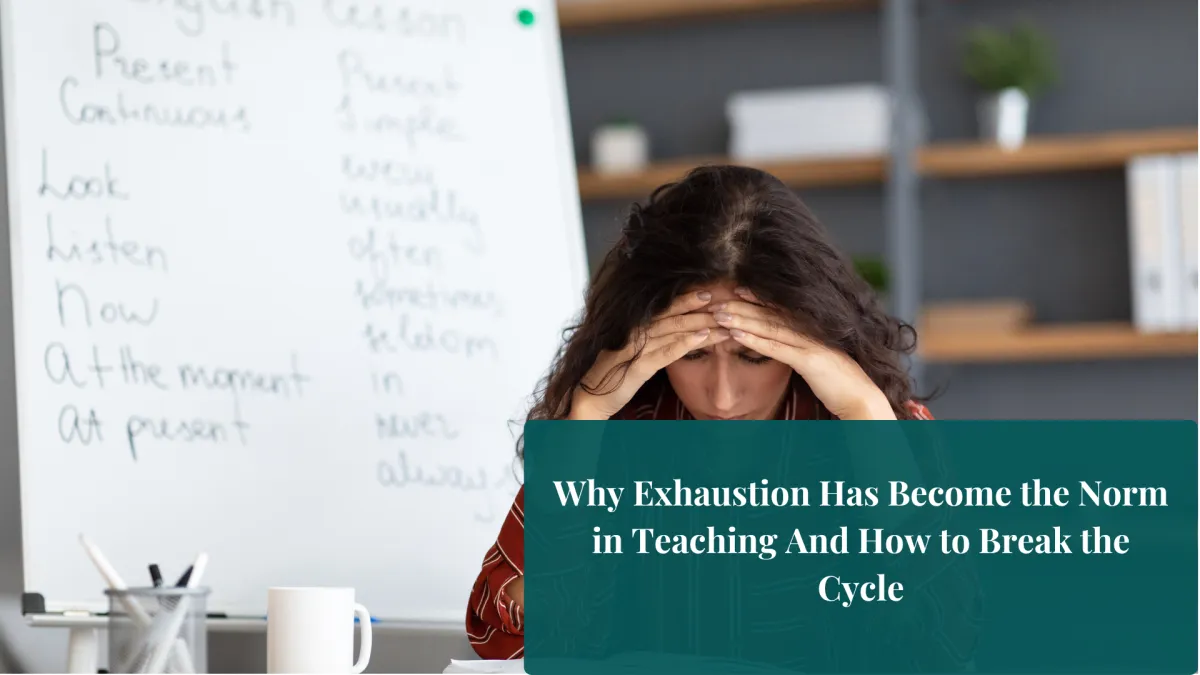Find out latest news, insights and tips from Aster Academy
Blog

Why Exhaustion Has Become the Norm in Teaching And How to Break the Cycle
Why Exhaustion Has Become the Norm in Teaching And How to Break the Cycle
When I posted a reel recently about the quiet lies teachers carry, the ones that keep us stuck and silently suffering, I didn’t expect the sheer wave of response that followed.
DM after DM. Comments like:
“I thought it was just me.”
“I didn’t realise how much this had become my normal.”
“You’ve just described my entire last term.”
The line that hit hardest?
“We normalise so much in teaching that just… isn’t normal.”
And the most dangerous of all?
Feeling constantly exhausted, and believing that’s just how it has to be.
So let’s talk about that.
We’ve come to expect a level of tiredness that seeps into everything:
Waking up on edge
Working through illness
Breaking down over a printer jam, then calling it “just stress”
Losing our Sunday nights to dread and planning
It’s become so baked into the culture of teaching that we no longer question it.
We wear it like a badge. Or worse, a price we pay for caring.
But here’s the truth:
You can love teaching and still find it unsustainable.
You can care about your students and still feel completely depleted.
You can be brilliant at your job and still be exhausted by what it’s costing you.
So what do you do when exhaustion has become your normal?
Here’s what I want to offer...not a fix, but a shift.
1. Name it without shame
Exhaustion isn’t a weakness. It’s a signal.
Start by simply noticing what it’s like to be you right now: physically, emotionally, mentally. Say it without sugarcoating it.
“I’m tired in a way that rest doesn’t fix.”
“I’ve been on autopilot for weeks.”
“I don’t remember the last time I felt like myself.”
That awareness alone is powerful.
2. Question the script
Many teachers carry internal beliefs like:
“If I just get to half term, I’ll feel better.”
“This is just what teaching is.”
“Other people are managing; I should be able to, too.”
But where did those come from? Are they true? Are they helpful?
Begin to notice the scripts you’ve absorbed and gently start to challenge them.
3. Redefine rest
Rest isn’t just sleep.
Rest is non-productivity. It’s saying no to another task. It’s ten minutes where no one needs anything from you.
If proper rest feels out of reach, start small:
Block out 15 minutes after school to sit in silence
Say no to one thing this week
Turn your phone off during lunch - just once
Tiny acts of resistance. Tiny acts of recovery.
4. Let yourself be witnessed
One of the hardest parts of exhaustion is the loneliness of it.
Find one space, just one, where you don’t have to perform.
Where you can drop the smile and say, “Actually… I’m not okay.”
Whether that’s a trusted colleague, a journal, or someone outside the school bubble - you deserve to be seen in your full self, not just your professional one.
And finally, let me say this: you don’t have to leap.
There’s no need for a dramatic decision, no pressure to reinvent everything overnight and certainly no expectation that you have it all figured out.
In fact, some of the most powerful turning points don’t begin with action at all. They begin with stillness. With choosing, perhaps for the first time in a long time, to pause. To create the smallest possible space in which you can begin to hear yourself again.
Because somewhere beneath the exhaustion and the endless expectations, beneath the mask you wear and the role you play so well, there’s still a voice, a quiet, steady presence, that has been asking for your attention.
And if you listen closely enough, you might hear it wondering:
What if Monday didn’t have to feel like this anymore?
You don’t need to know the answer to that question just yet.
But you are absolutely allowed to begin asking it.

© 2023 Aster Academy - All Rights Reserved. Privacy Policy.




